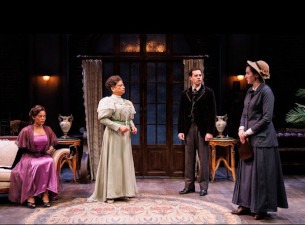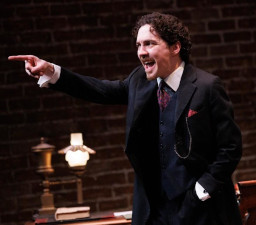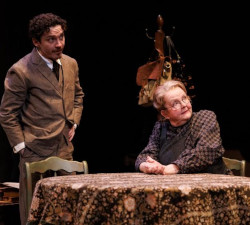
Eric
Uhlfelder
| CLASS AND CROWD CONTROL "Garside's Career" by Harold Brighouse
I remember entitling an article, “When Words Mattered.” Of the many takeaways from the Mint’s current production is that in this instance they don’t. This is not to throw shade on the play. To the contrary. "Garside’s Career" is a play about the early 20th century rise of a young artful orator who had just earned his coveted BA that’s enhanced his prospects as an engineer. Instead, he jumps at the chance to fill a newly opened Labour seat in British Parliament. One likely cost: his engagement to a woman who fears the hazards of Peter Garside’s love of public speech. Early on Peter explains: “Public speaking's always been a joy to me. You don't know the glorious sensation of holding a crowd in the hollow of your hand, mastering it, doing what you like with it.” It’s not initially clear why his bride to be, Margaret Shawcross, thinks the opportunity-- brought to Peter by local labor leaders--a Faustian bargain. She shares Peter’s politics and knows quite well that Socialist expression can jeopardize her teaching career. Why then would trading in meaningful work of building things for a seat in government be any sort of moral betrayal?
In response to this working-class lad having earned his degree amidst well-to-do students, we get an early sample in just casual conversation amongst friends of how well Peter can spin a thought: “Something got hold of me and urged me on. Injustice! Tyranny! The consciousness of class. The knowledge that in the eyes of my well-to-do competitors I was an inferior animal. My hands are rough with toil, the toil they batten on, and so they mocked at me for daring to compete with them—a man with a trade. They know now what a working man can do with his brain. They laughed on the wrong side of their fat faces, when the list came out tonight.” But Margaret intuits that perhaps vanity not substance may drive Peter. MARGARET: “I know (this) fascination's fatal. I saw it growing on you—this desire to speak, to be the master of a mob. I hoped I'd cured you of it . . . I've seen men ruined by this itch to speak. You know them. Men we thought would be real leaders of the people. And they spoke, and spoke, and soon said all they had to say, became mere windbags trading on a reputation. Don't be one of these, Peter. You've solider grit than they. The itch to speak is like the itch to drink, except that it's cheaper to talk yourself tipsy.” Will Peter prove an effective politician or will Margaret’s fear be borne out? That’s the matter this thoughtful play tracks, and in the process observing character and behavior that’s as relevant today as when the play was written right before the outbreak of the First World War. Giving depth to this plot line are Shavian observances of class distinction. One instance: when Peter’s Margaret is confronted by Lady Mottram, a member of her school’s governing board at which she teaches. LADY MOTTRAM: “You've suffered no inquisition into your private
life? No interference into your personal affairs?” Soon after he wrote Garside’s Career, British-born playwright Harold Brighouse made it to Broadway in his Hobson’s Choice (which since has been adapted multiple times for film and television). A part of the Manchester School of playwrights, his broad body of work of 30 plays however remains largely obscure like most Mint authors. Mint’s artistic director, Jonathan Bank is a master of mining lost talent. In 2010, The Guardian ranked Brighouse as “one of prewar northern England’s most respected and neglected playwrights . . . whose work was considered ground-breaking,” but failed to be celebrated in London’s West End. In its always thoughtful playbill, the Mint’s dramaturgical advisor Jesse Marchese beautifully describes the playwright’s overarching theatrical target: “Though specific to their time and place, Brighouse’s plays transcend their regional charm through their incisive accounts of the uneasy relations between laborers and capital, the precarious lure of fame and success, as well as the human drive to carve out a happy and meaningful life in the face of great hardships. Indeed, more than just a “regional writer,” Brighouse is a playwright for our, and all, times.” As usual, this Mint production is artfully set by Christopher and Justin Swader and seamlessly directed by Matt Dickson.
The ensemble of actors tell this tale well, from Peter (cleverly portrayed by Daniel Marconi) to his mom (a comically droll Amelia White); Margaret (a devoutly misunderstood Madeline Seidman who may have the hardest role of all) to Peter’s passing high-class young muse (Gladys played charmingly by Sara Haider). But it’s Glady’s brother Freddie (Avery Whitted) whose screwball character steals our attention. FREDDIE: “Yes. I say. I know I'm being asinine. I am rather an ass. But I'm a genial sort of ass, and if there's one thing I can't stand it's one woman being beastly to another. Women are the limit. What I mean is, can I do anything for you?” To which I would answer to theater goers: Yes, come see this show.
|
| recordings | coupons | publications | classified |



